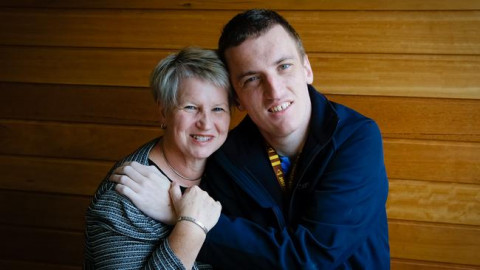
The widow of former deputy prime minister Tim Fischer has accused the Coalition of mismanaging the National Disability Insurance Scheme, which she says is shrouded in secrecy and too important to fail.
Judy Brewer, a high-profile disability sector advocate whose son Harrison has autism, said she was angry the government appeared to be blaming people with disabilities for cost blowouts when it was likely the $24bn scheme’s financial assumptions were wrong.
“How could such a vital social reform, welcomed by an overwhelming majority of Australians, be so mismanaged as to have disengaged the people, the sector and the community who most need it to perform,” she said. “People are not exiting the scheme in the numbers expected. In real terms, that means they are not moving towards the level of independence that was envisaged.”
Ms Brewer said the early intervention pathway that was designed to provide participants with the support necessary to transition away from the scheme and live independently was not working as intended.
She said the National Disability Insurance Agency’s most recent functionality report should “set off red flags” that outcomes for participants, their parents and carers were not being met.
Her comments came after the NDIA released financial data showing the cost of the scheme was 3 per cent higher in July than had been forecast just months earlier. Government Services Minister Linda Reynolds said the figures showed the scheme was facing “sustainability challenges”.

Former deputy prime minister Tim Fischer
READ MORE:NDIS assessors ‘lack empathy, too bureaucratic’|Reynolds’ NDIS costings wrong: Shorten|NDIS ‘to outstrip cost of Medicare within two years’|Cost blowout crushes NDIS
Part of the problem, some analysts say, is that fewer than expected participants are transitioning out from the NDIS. The scheme had forecast a 2.01 per cent exit rate for those under 7 years of age; the most recent update showed this was at just 0.61 per cent.
For those over 7 years of age, a 1.04 per cent exit rate was expected; in reality, it was 0.42 per cent.
Ms Brewer said there needed to be greater transparency around the modelling and while early intervention could be enormously beneficial, autism was for life. “I don’t understand why there is an assumption some Australians were going to come into the system and then quickly exit,” she said.
Labor government services spokesman Bill Shorten earlier this week accused Senator Reynolds and the NDIA of releasing fake information to suggest the scheme was in a worse financial position than it actually was.
“The NDIA reports (Jan-June 2021) average participant annual spend is $55,900,” he said. “Which means Minister Reynolds’ media release amount of $53,400 is actually a decrease of $2500 per participant.”
The official figures first published by The Australian on Monday concluded that the overall cost of the scheme could be headed higher than that report’s projected $40.7bn for 2024-25, which itself was $8.8bn above budget forward estimates.
On Wednesday, the row over the costings deepened when Senator Reynolds said Mr Shorten was being “deliberately misleading” and causing “unnecessary concern among NDIS participants”.
“Mr Shorten claim that NDIS participant support has reduced is based on comparing a monthly figure with a six-month rolling average,” she said. “When assessing data it is vital to compare like periods. “
Mr Brewer said participants, their families and carers needed greater certainty as she called on the NDIA and Senator Reynolds to listen to participants and use the “reams of evidence available” to see what reforms could be made to reduce costs while making a crucial taxpayer investment work for all using the scheme.
“Start using the reams of new research and evidence available as to what should be funded and what might work to improve the lives of those we love and who deserve better than the mismanagement that has characterised this scheme in recent times,” she said. “It is too important to fail.”
The NDIA has also faced questions from states governments over the reliability of the data that underpins its financial projections, and has now agreed, after years of requests, to provide all data and modelling as a condition of any future federal legislative changes to the scheme.
In a bid to alleviate concerns in the disability community that the government is looking to cut back on eligibility for the NDIS and the level of entitlements, officials charged with developing the financial sustainability scheme have been told to consult them during its development.
from https://www.theaustralian.com.au/nation/coalition-has-made-a-mess-of-nd…